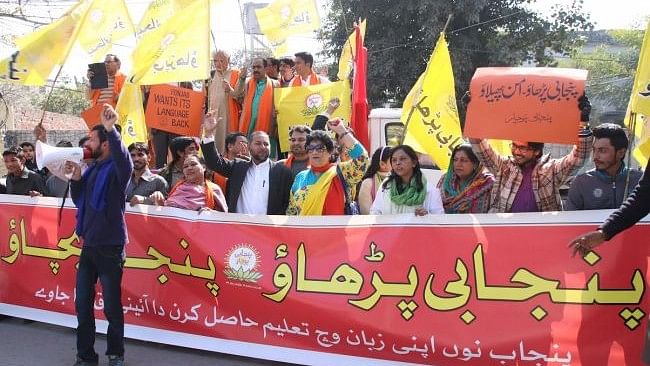The Struggle to Preserve the Punjabi Language
Respecting One’s Linguistic Heritage
Zahid is a 15-year-old Punjabi boy from Pakistan who is passionate about preserving his native language and cultural identity. Despite coming from an upper-middle class family, he was never taught Punjabi by his parents who prefer speaking Urdu at home like most households in Punjab. Zahid strongly believes that the rich Punjabi literature and folk traditions are being lost as more people abandon their mother tongue. He respects the working class Punjabis who continue speaking their native language in their daily lives.

Responding to Urdu with Punjabi
Whenever Zahid’s parents or teachers speak to him in Urdu or English, he politely responds in Punjabi to assert its importance. They usually say that Urdu is Pakistan’s national language so he should use it, but he counters that Punjabi is Punjab’s language so they should speak it instead. After some time, his parents started conversing with him in Punjabi which made Zahid very happy. He is pleased that his younger siblings and cousins are now learning to value their cultural heritage through their mother tongue.
Facing Criticism for Language Pride
However, Zahid’s friends criticize him as being “jaahil” or “ganvaar” for prioritizing Punjabi. While these terms mean uncivilized or illiterate respectively, Zahid sees it as a mark of education and evolution to stand up for one’s linguistic rights. He could not speak Punjabi well until a few years ago, but immersed himself in learning to assert his cultural identity. Zahid is determined to preserve the language despite facing disapproval from some of his peers.
A Unified Linguistic Identity in Other Provinces
Zahid notes that other provinces like Khyber Pakhtunkhwa, Sindh and Balochistan have maintained unified linguistic identities with Pashto, Sindhi and Balochi respectively being dominant. In comparison, some Punjabis have forsaken their heritage for Urdu which originated from speakers of Hindi in India. This shift occurred due to a lack of governmental promotion of Punjabi in Pakistan.
Lessons from Bangladesh’s Language Movement
In contrast, the people of erstwhile East Pakistan fought and even died to have Bengali recognized as a national language. This culminated in the declaration of International Mother Language Day on February 21st each year. Zahid deeply respects Bengalis for their commitment to preserving their culture and identity. He wishes Punjabis would demonstrate similar passion for their language instead of passively accepting the dominance of Urdu.
Seeking Official Recognition for Punjabi
If the government will not declare Punjabi a national language of Pakistan, Zahid hopes it can at least be mandated for use in the Punjab Assembly. He finds it concerning when foreign languages like Mandarin Chinese receive more attention than the preservation of Punjabi. Zahid dreams of starting a movement to advocate for his linguistic heritage, though acknowledges it will be challenging given societal attitudes. Overall, he wants Punjabis to change how they perceive their own language before it disappears within Punjab.
Comparing Punjabi and Urdu Structures
While exploring the relationship between Punjabi and Urdu more, Zahid notes they share a significant portion of vocabulary but with different pronunciations and spellings for many words. For instance, “pakrna” means “to catch” in Urdu versus “pharna” in Punjabi. Their grammars are also quite similar sans any major deviations. He sees the languages as akin to Spanish and Italian in how closely related yet distinct they are. Most interestingly, Zahid can understand Standard Urdu more easily than other Punjabi dialects like Saraiki or Pothwari, despite being nearer linguistically. This anomaly highlights the dominance Urdu has gained over indigenous languages in the region.
Continuing the Fight for Linguistic Justice
In concluding his thoughts, Zahid remains resolute that Punjabi must be preserved to honor the cultural heritage of generations who spoke it. While he faces opposition now, history shows how movements can effect change with perseverance on issues of linguistic and ethnic identity. Bangladesh’s example particularly inspires Zahid that passions run deep when a population unites for their mother tongue. He may still be young, but is ready to enlighten and mobilize others on this important struggle. Only by respecting diversity and people’s rights can a truly equitable and harmonious society be built.
